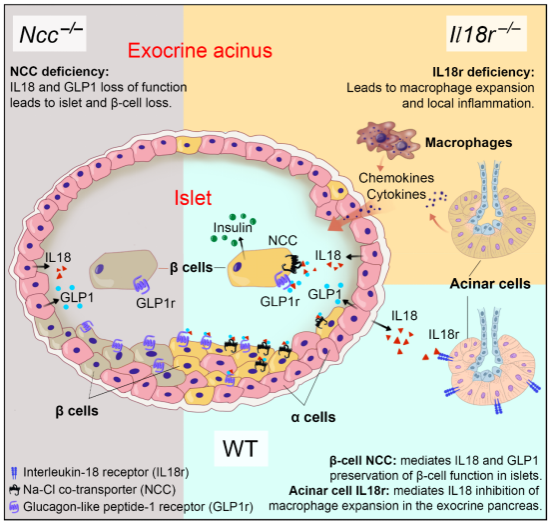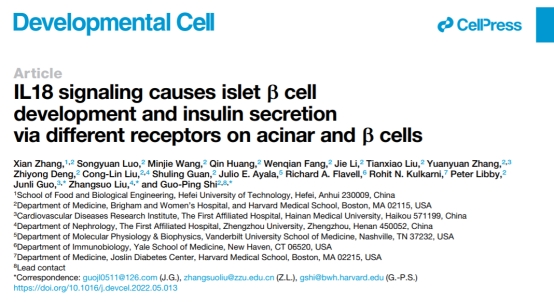cover
Our school has made an important progress in the field of diabetes regulation mechanism.

On June 20, 2022, Associate Prof. Xian Zhang at Hefei University of Technology published a paper in Developmental Cell titled IL18 signaling causes islet β cell development and insulin secretion via different receptors on acinar and β cells in collaboration with Prof. Guo-Ping Shi at Harvard Medical School. This research reported a consistent role of IL18r- and NCC-mediated IL18 signaling in islet insulin secretion that improves experimental hyperglycemia and insulin resistance.

Type 1 (T1D) and type 2 diabetes (T2D) are characterized by the reduction of β cell function, reflecting genetic and environmental predisposition to defective control of β cell survival and insufficient replenishment of new β cells. The reprogramming of β cell proliferation, differentiation, and regeneration from pluripotent non-pancreatic islet cells are proposed as potential targets for the reversal of established insulin- dependent T1D and T2D. Analysis of T1D and T2D subjects reveals the infiltration of inflammatory cells and augmented cytokine expression in islets and insulin-sensitive tissues. Interleukin 18 (IL18), a member of the IL1 family, is expressed in inflammatory cells and adipocytes. Diabetic patients show elevated circulating IL18 levels. Intriguingly, IL18 increased islet insulin production and suppressed the development of spontaneous T1D. The mechanisms by which IL18 controls islet insulin secretion and function in diabetes remain unknown.
Here, this study reported that Islet α cells are the source of pancreatic IL18 that, together with GLP1, uses NCC and GLP1r in islets to control β cell proliferation, insulin production, and apoptosis. IL18 also uses IL18r on acinar cells to control islet and exocrine tissue macrophage expansion and inflammation to assist β cell function. Global deficiency of IL18r and/or NCC led to β cell damage and enhanced islet inflammation in high-fat diet (HFD)-fed and streptozotocin (STZ)-treated mice. NCC-selective deficiency in β cells reduced β cell content, size, and proliferation and enhanced hyperglycemia and insulin resistance. IL18r deficiency in acinar cells increased macrophage recruitment, decreased β cell content and size, and also promoted hyperglycemia and insulin resistance. These findings support a protective role for IL18 in β cell function mediated by NCC, GLP1r, and IL18r.
Associate Prof. Xian Zhang form Hefei University of Technology is the first author of the article. School of Food and Biological Engineering at Hefei University of Technology is the first institution of the paper. Guo-Ping Shi from Harvard Medical School, Zhangsuo Liu from Zhengzhou University, and Junli Guo from Hainan Medical University are the corresponding authors of the paper.
Link: https://www.cell.com/developmental-cell/fulltext/S1534-5807(22)00370-7
